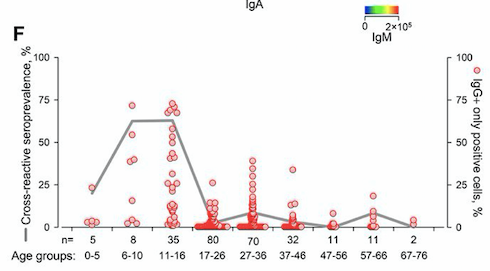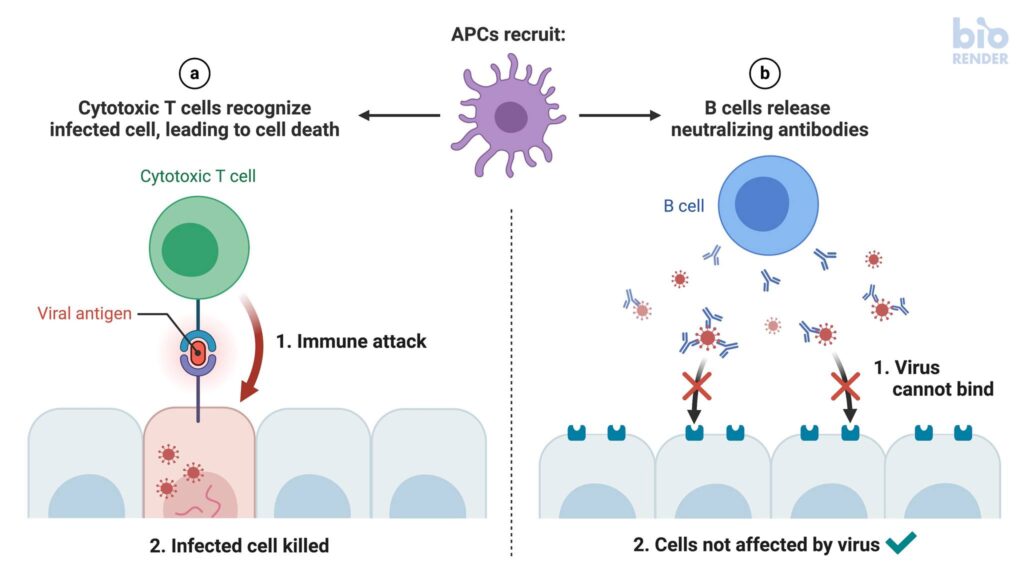A: Maybe; there *is* evidence of antibodies to seasonal coronaviruses reacting to some parts of the SARS-CoV-2 virus.
BUT so far there is no solid evidence that these antibodies protect from COVID-19 infection or disease.
What does it mean to have “cross-reactive” antibodies? There are four “common” or seasonal human coronaviruses which are one cause of the common cold. When exposed to a pathogen, our AMAZING immune systems produce antibodies specific to fighting that particular virus by binding to the surface of the virus and blocking its entry into our cells.
Because of some similarities in the structure of all coronaviruses, these antibodies can *potentially* bind to regions of the spike protein which are shared between SARS-CoV-2 and seasonal coronaviruses, thus the “cross-reactivity.” So, these antibodies were not custom built for SARS-CoV-2–but like wrestling the wrong size lid onto a Tupperware container–there is chance they could be “close enough” to block some entry of the virus into our cells and prevent or minimize disease. “Neutralizing antibodies” not only bind to a virus, but they do so in a way that blocks infection.
Two recent studies have shown evidence for some degree of cross-reactivity of antibodies to seasonal coronaviruses and SARS-CoV-2.
In the first study, Dr. Kevin Ng and colleagues found antibodies reactive to the SARS-CoV-2 spike in several samples of blood collected from people *prior* to the pandemic (meaning there was no chance they had previously been infected with SARS-CoV-2).
• The prevalence of reactive antibodies was highest in children and adolescents aged 6-16, peaking at 62%. This may because circulating of common coronaviruses is more common in children.
• There was *suggestive* evidence that these cross-reactive antibodies might protect against COVID-19 because they neutralized SARS-CoV-2 infection in cells in vitro (in a lab dish, not a real human), though not as strongly as antibodies from the blood of COVID-19 patients.
Another study by Dr. Scott Hensley and colleagues found some evidence consistent with Ng, et al but also some important differences.
• They found that around 23% of individuals had human coronavirus reactive antibodies, but that these cross-reactive antibodies were NOT neutralizing against SARS-CoV-2 (again in a dish, not humans).
• They did not find that kids had higher levels of pre-pandemic SARS-CoV-2 cross-reactive antibodies compared to adults.
• Importantly, in real humans (not cells in a dish) having pre-pandemic cross-reactive antibodies DID NOT protect from SARS-CoV-2 infection or hospitalization.
BOTTOM LINE:
The immune system is super cool. We are continuing to learn more about the immune response to SARS-CoV-2 and how it interacts with previous exposures.
While there is a chance that frequent exposure to other human coronaviruses may provide some protection to younger people from severe infection, the evidence is mixed and in adults there is no evidence that cross-reactive antibodies protect against COVID-19 disease or severity.
There is also no evidence to suggest that a large percentage of the population is already immune to the disease from cross-reactive antibodies.
Which means… keep doing ALL THE THINGS to prevent transmission…you guys know what to do! #StaySMART
Love,
Those Nerdy Girls
Links to scientific articles:
Fantastic video by immunologist Dr. Akiko Iwasaki, COVID-19 Immunology 101 for Non-immunologists




